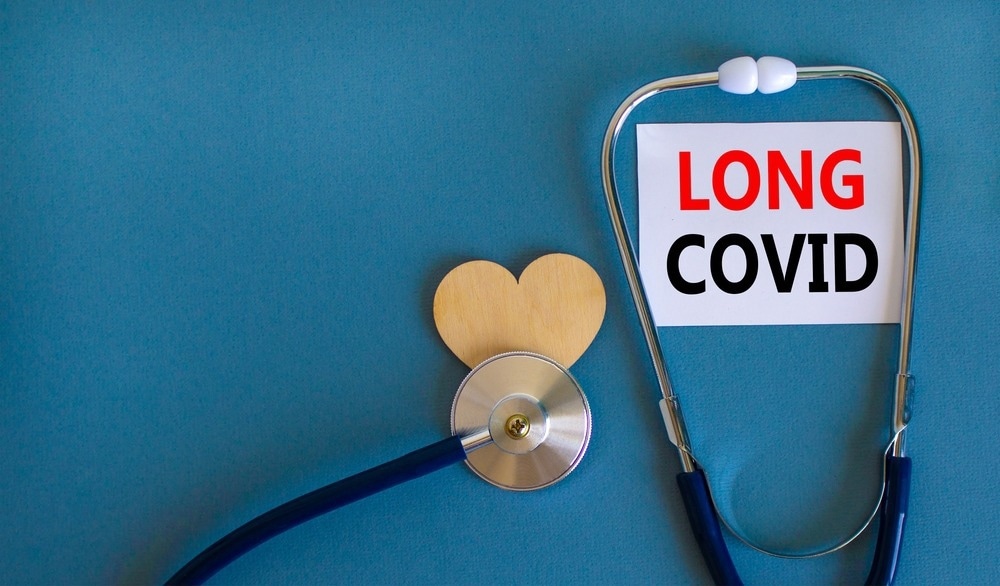In a recent study published in the journal JAMA Network Open, researchers investigated the challenges faced by adults in the United States (U.S.) between the ages of 18 and 64 with post coronavirus disease 2019 (COVID-19) condition (PCC) in accessing affordable healthcare.
Study: Health Care Access and Affordability Among US Adults Aged 18 to 64 Years With Self-reported Post–COVID-19 Condition. Image Credit: DmitryDemidovich/Shutterstock.com
Background
Post-COVID-19 condition or the post-acute sequelae of severe acute respiratory syndrome coronavirus 2 (SARS-CoV-2) infection, commonly known as long coronavirus disease (long COVID), is the persistence of COVID-19 symptoms long after recovering from an acute SARS-CoV-2 infection.
The symptoms generally consist of fatigue, loss of taste and smell, post-exertional malaise, shortness of breath, musculoskeletal pain, and cognitive impairments, although the severity and duration of these symptoms vary across patients.
Studies have reported that the incidence of PCC could be from 5% to greater than 20%. Ongoing research also indicates that the risk of PCC is higher among individuals with comorbidities, women, and unvaccinated individuals.
Chronic fatigue, myalgic encephalomyelitis, and other PCC symptoms might present difficulties in accessing the healthcare system and circumventing barriers such as lack of accessibility to clinicians, denial of health insurance, and clinicians lacking knowledge about PCC. These challenges could exacerbate PCC symptoms and reduce the overall quality of life.
About the study
In the present study, the researchers used data from the health reform monitoring survey conducted between June 17 and July 5, 2022. The respondents for this survey were recruited nationally, covering close to 97% of households in the U.S.
The participants comprised adults between 18 and 64, spanning white, asian, hispanic, black, and other races from households with high and low incomes. The survey was administered in spanish as well as english.
The survey asked the participants whether they were informed by a doctor or healthcare professional or through a test about COVID-19.
The participants who responded affirmatively were asked whether they were experiencing COVID-19 symptoms for more than four weeks after recovering from the SARS-CoV-2 infection.
The participants were also prompted to describe their long-term symptoms. Based on the responses, the study population was classified into three groups: those currently experiencing PCC, individuals diagnosed with COVID-19 but did not experience PCC, and individuals never diagnosed with COVID-19.
The respondents were also asked about various healthcare access outcomes, such as having a regular place of healthcare and not being able to afford consultations from a doctor or specialist, medical tests, prescription medications, follow-ups, and treatment in the last year.
Other measures included difficulties in transportation to the clinic, finding a clinician, and getting appointments. The inability to pay past and current unpaid medical bills was also queried.
The difficulties in healthcare access were analyzed based on demographic factors such as age, sex, education levels, citizenship status, and race and ethnicity, which were obtained from a questionnaire on the household profile.
The analysis focused on race and ethnicity as major factors for disparities in access to healthcare facilities and the prevalence of PCC.
Additional information on the presence of dependent children, marital status, and diagnosis of one or more physical conditions, including high cholesterol, stroke, hypertension, cancer, heart disease, asthma, chronic bronchitis, diabetes, emphysema, chronic obstructive pulmonary disease, lupus, arthritis, fibromyalgia, and gout was also obtained.
Results
The results indicated that adults between the ages of 18 to 64 years with PCC had a higher probability of facing difficulties in accessing and affording health care than other adults. Of the 9,484 individuals who responded to all aspects of the survey, 3,382 reported being diagnosed with COVID-19, and 833 were currently experiencing PCC symptoms.
After adjusting for geographic, health, and demographic factors, the findings indicated that compared to individuals who had been diagnosed with COVID-19 but did not experience PCC symptoms and individuals who had never been diagnosed with COVID-19; individuals who had been diagnosed with COVID-19 and were suffering from PCC had faced challenges in areas of healthcare costs, findings clinicians, getting appointments on time and getting authorization for a health care plan.
Lack of knowledge among the clinicians about PCC, PCC patients being unaware of the multidisciplinary PCC clinics, insufficient coordination and urgency in the established federal PCC initiatives, and barriers related to insurance reimbursements were some of the major areas of difficulty.
Conclusions
Overall, the findings indicated that adults in the U.S. between the ages of 18 and 64 who were experiencing PCC symptoms were likely to face more challenges in accessing healthcare facilities and affording the cost of treatment than adults who did not have PCC.
These challenges could have long-term implications on disability, quality of life, and workforce participation.


